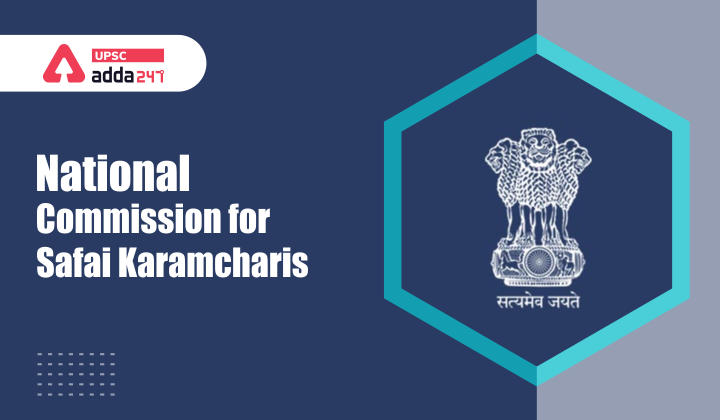Table of Contents
National Commission for Safai Karamcharis: Relevance
- GS 2: Government policies and interventions for development in various sectors and issues arising out of their design and implementation.
National Commission for Safai Karamcharis: Context
- Recently, the cabinet committee has approved the extension of the tenure of the National Commission for Safai Karamcharis (NCSK) for three years beyond 31.3.2022.
National Commission for Safai Karamcharis: Key points
- The major beneficiaries would be the Safai Karamcharis and identified manual scavengers in the country since the NCSK has been extended for 3 more years.
- The number of Manual Scavengers identified under the Manual Scavenging Act Survey as on 31.12.2021 is 58098.

About NCSK
- The NCSK was established in the year 1993 as per the provisions of the NCSK Act 1993 initially for the period upto 1997.
- Later the validity of the Act was initially extended upto 2002 and thereafter upto 2004.
- The NCSK Act ceased to have effect from 29.2.2004. After that the tenure of the NCSK has been extended as a non-statutory body from time to time through resolutions.
- The tenure of the present Commission is upto 31.3.2022.
What NCSK does?
- The NCSK has been giving its recommendations to the Government regarding specific programmes for welfare of Safai Karamcharis, study and evaluate the existing welfare programmes for Safai Karamcharis, investigate cases of specific grievances etc.
- As per the provisions of the Prohibition of Employment as Manual Scavengers and their Rehabilitation Act, 2013, the NCSK has been assigned the work
- to monitor the implementation of the Act,
- tender advice for its effective implementation to the Centre and State Governments, and
- enquire into complaints regarding contravention/non-implementation of the provisions of the Act.
NCSK composition
- The National Commission for Safai Karamcharis comprises
- one Chairman (in the rank and status of the Union Minister for States) and
- four members, including a lady member (in the rank and status of the Secretary to the Government of India) and the Secretary (in the rank of Joint Secretary to the Govt. of India) along with other supporting staff.
Manual scavenging in India
- In July last year, government declared that no deaths were reported in the country due to manual scavenging, however, the government admitted that 941 sanitation workers died nationwide while cleaning sewers and septic tanks.
- Though the Government has taken many steps for the upliftment of the Safai Karamcharis, the deprivation suffered by them in socio-economic and educational terms is still far from being eliminated.
- Although manual scavenging has been almost eradicated, sporadic instances do occur.
- Hazardous cleaning of sewer/septic tanks continues to be an area of the highest priority for the Government.
- Hence, the Government feels that there is a continued need to monitor the various interventions and initiatives of the Government for welfare of Safai Karamcharis and to achieve the goal of complete mechanization of sewer/septic tanks cleaning in the country and rehabilitation of manual scavengers.
- India has banned the practice under the Prohibition of Employment as Manual Scavengers and their Rehabilitation Act, 2013.
What is manual scavenging?
- Manual scavenging is the practice of physically removing human excreta by hand from sewers or septic tanks. This dehumanizing practice is mostly undertaken by members of the Dalit community, which is at the bottom of India’s caste system.
- According to the 2013 Act, the definition of manual scavengers was broadened to include people employed to clean septic tanks, ditches or railway tracks.
Also Read:




 TSPSC Group 1 Question Paper 2024, Downl...
TSPSC Group 1 Question Paper 2024, Downl...
 TSPSC Group 1 Answer key 2024 Out, Downl...
TSPSC Group 1 Answer key 2024 Out, Downl...
 UPSC Prelims 2024 Question Paper, Downlo...
UPSC Prelims 2024 Question Paper, Downlo...




